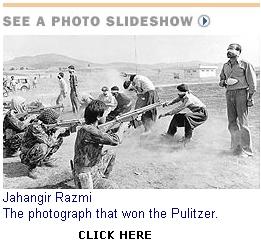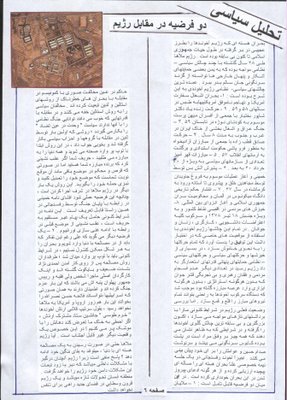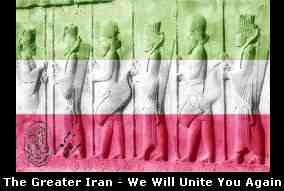It has been brought to my attention that someone has been posting trash on the interent with my name. This terrible article has been reproduced in full below. IT DOES NOT REPRESENT THE VIEWS OF MARZE POR GOHAR PARTY, NOR DOES IT EXPRESS THE VIEWS OF RUZBEH HOSSEINI IN ANY WAY.
Do the enemies of freedom really think they can crush us like this? They need to do better then that. All authentic articles are posted on this blog and/or on the Marze Por Gohar website. All articles that use my name shall be verified on this blog from this day forth. All others shall be considered false.
Sincerely,
Ruzbeh HosseiniOriginal______________________________________________________________
Great article written by a pro western Iranian .. defeckted and shae be prepared for an education this was taken from a Iranians for a free Iran.. This are the types of Muslims that will defeat jihadists but they need our support as do the Sinoira govt in lebanon does...
Iran Is at War with Us, Someone Should Tell the U.S. Government
Iran’s Supreme Leader, Ali Khamenei, is dying of cancer. But he is convinced that his legacy will be glorious. He believes that thousands of his Revolutionary Guards intelligence officers effectively control southern Iraq, and that the rest of the country is at his mercy, since we present no challenge to them — even along the Iraq/Iran border, where they operate with impunity. They calmly plan their next major assault without having to worry about American retribution.
The mullahs have thousands of intelligence officers all over Iraq, as well as a hard core of Hezbollah terrorists — including the infamous Imadh Mughniyah, arguably the region’s most dangerous killer — and they control the major actors, from Zarqawi to Sadr to the Badr Brigades.
Khamenei and his top cronies believe they have effectively won. They think the U.S. is politically paralyzed, thanks to the relentless attacks of President Bush’s opponents and the five-year long internal debate about Iran policy, and thus there is no chance of an armed attack, even one limited to nuclear sites. They think Israel is similarly paralyzed by Sharon’s sudden departure and the triumph of their surrogate force, Hamas, in the Palestinian elections. They despise the Europeans, and hardly even bother to pretend to negotiate with them any more. They believe they have a strong strategic alliance with the Russians and they think they have the Chinese over a barrel, since the Chinese are so heavily dependent on Iranian oil. Recent statements from Beijing and Moscow regarding the chance of U.N. sanctions will have reinforced the Supreme Leader’s convictions.
Hapless in the Beltway
Above all, Khamenei believes he has broken the American will, for which he sees two pieces of evidence. The first is that there seems to be very little American resolve to do anything about punishing Iran for the enormous traffic of weapons, poisons, and terrorists into Iraq from Iran. Khamenei must inclined to believe that the Bush administration has no stomach for confrontation.
We have done nothing to make the mullahs’ lives more difficult, even though there is abundant evidence for Iranian involvement in Iraq, most including their relentless efforts to kill American soldiers. The evidence consists of first-hand information, not intelligence reports. Scores of Iranian intelligence officers have been arrested, and some have confessed. Documentary evidence of intimate Iranian involvement with Iraqi terrorists has been found all over Iraq, notably in Fallujah and Hilla. But the "intelligence" folks at the Pentagon, led by the hapless Secretary Stephen Cambone, seem to have no curiosity, as if they were afraid of following the facts to their logical conclusion: Iran is at war with us.
In early March, to take one recent example, several vehicles crossed from Iranian Kurdistan into Iraqi Kurdistan. The Iraqis stopped them. There was a firefight. The leader of the intruding group was captured and is now in prison, held by one of the Kurdish factions. The Kurds say that the vehicles contained poison gas, which they have in their possession. They say they informed the Turks, who said they did not want to know anything about it (the Turks don’t want anything to do with the Kurds, period, and they shrink from confrontation with the mullahs).
The Kurds holding this man say that he confessed to working for the Iranian Revolutionary Guards. Apparently they have his confession. They say they are willing to make him available to U.S. military personnel. But the Pentagon, which has all this information, has not pursued the matter. This is just one of many cases in which the Iranians believe they see the Americans running away from confrontation.
The second encouraging sign for Khamenei is the barely concealed delight in Washington, including Secretary Rice’s recent statement at a press conference, that we will soon be negotiating with Iran about Iraq. This mission has been entrusted to Ambassador Khalilzad, who previously worked with the Iranians when he represented us in Kabul. It is a bad decision, and it is very hard to explain. The best one can say is that Khalilzad speaks Farsi, so he will know what they are saying, and it is probably better to have public dealings than the secret contacts this administration has been conducting all along. But those small bright spots do not compensate for the terrible costs the very announcement of negotiations produces for us, for the Iranian people, and for the region as a whole.
Talk Does Not Thwart
Iran has been at war with us for 27 years, and we have discussed every imaginable subject with them. We have gained nothing, because there is nothing to be gained by talking with an enemy who thinks he is winning. From Khamenei’s standpoint, the only thing to be negotiated is the terms of the American surrender, and he is certainly not the only Middle Eastern leader to take this view; most of the leaders in the region dread the power of the mullahs — now on the doorstep of nuclear military weapons — and they see the same picture as Khamenei: America does nothing to thwart Iran, and is now publicly willing to talk. In like manner, many Iranians will conclude that Bush is going to make a deal with Khamenei instead of giving them the support they want and need to challenge the regime.
If this administration were true to its announced principles, we would be actively supporting democratic revolution in Iran, but we do not seem to be serious about doing that. Yes, Secretary Rice went to Congress to ask for an extra $75 million to "support democracy" in Iran, but the small print shows that the first $50 million will go to the toothless tigers at the Voice of America and other official American broadcasters, which is to say to State Department employees. The Foreign Service does not often drive revolutionary movements; its business is negotiating with foreign governments, not subverting them. There were whispers that we were supporting trade unions in Iran, which would be very good news, but such efforts should be handled by private-sector organizations, not by the American government per se.
Yet this seems a particularly good moment to rally to the side of the Iranian people, who are known to loathe the regime of Ayatollah Khamenei, and who are showing their will to resist in very dramatic fashion. About ten days ago, seventy-eight regime officials were killed or captured in Baluchistan when a convoy (including the chief of the region’s Revolutionary Guards Corps and the regional governor) was attacked. Some of the captives have been shown on al-Jazeera, pleading for cooperation from the regime, and supporting their captors’ demands that five Baluchi prisoners be freed. The regime has responded by accusing the United States and Britain of masterminding the operation, which is the second such strike in the past six months. In addition to calling for the release of Baluchi prisoners, the insurgents are calling for the toleration of Baluchi Sunnis, the appointment of locals (instead of Persian Shiites) to govern the region, and the use of local radio and television.
Caring about Carnage
The situation in Kurdistan is likewise extremely tense. The city of Mahabad is now surrounded by the regime’s military and paramilitary forces, following the eruption of anti-regime demonstrations on the occasion of Persian New Year’s celebrations on March 20. It is impossible to get precise figures — Western journalists don’t seem to be able to cover such events — but dozens of Kurds were arrested and many more were beaten up in the streets.
Worst of all is the ongoing campaign of ethnic cleansing directed against the Ahwaz Arabs in Khuzestan, where up to three divisions of the army, the Revolutionary Guards, and the infamous thugs of the Basij have been deployed, following the sabotage of a major oil pipeline by anti-regime dissidents. Radio Farda, our official Farsi-language station, quoted a local journalist, Mr. Mojtaba Gehestani, who says that 28,000 Ahwazi Arabs have been jailed in the past ten months, hundreds have been summarily executed, and many corpses have been fished out of the Karoon River, with telltale marks of torture.
Nonetheless, the regime’s interior minister recently announced that there is no "ethnic problem or issue" in Iran today. But he has quite clearly failed to convince President Mahmoud Ahmadinejad that all is well. The president cancelled trips to the region four times in the past few months.
He and his cronies have a lot to worry about, because the Iranian people, in the face of a vicious wave of repression that recalls the worst moments of this dreadful regime, are showing themselves prepared to stand against it, and to move to remove it. Lacking a full picture, we should base our judgment at least in part on the behavior of the mullahs, and their dispatch of so many armed forces to three different regions suggests they are profoundly worried. This is not a good time to throw the mullahs a diplomatic lifeline. We should instead show them and their democratic enemies that the tide of history is running against them.
It’s time to take action against Iran and its half-brother Syria, for the carnage they have unleashed against us and the Iraqis. We know in detail the location of terrorist training camps run by the Iranian and Syrian terror masters; we should strike at them, and at the bases run by Hezbollah and the Revolutionary Guards as staging points for terrorist sorties into Iraq. No doubt the Iraqi armed forces would be delighted to participate, instead of constantly playing defense in their own half of the battlefield. And there are potent democratic forces among the Syrian people as well, as worthy of our support as the Iranians.
Once the mullahs and their terrorist allies see that we have understood the nature of this war, that we are determined to promote regime change in Tehran and Damascus, and will not give them a pass on their murderous activities in Iraq, then it might make sense to talk to Khamenei’s representatives. We could even expand the agenda from Iraqi matters to the real issue: we could negotiate their departure, and then turn to the organization of national referenda on the form of free governments, and elections to empower the former victims of a murderous and fanatical tyranny that has deluded itself into believing that it is invincible.
Original Article
by Ruzbeh Hosseini














.42.jpg)

